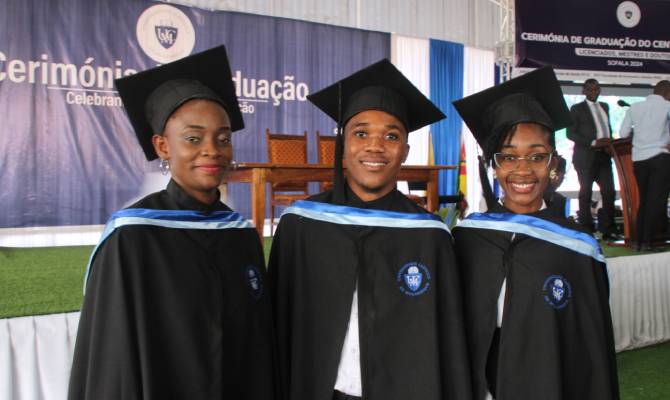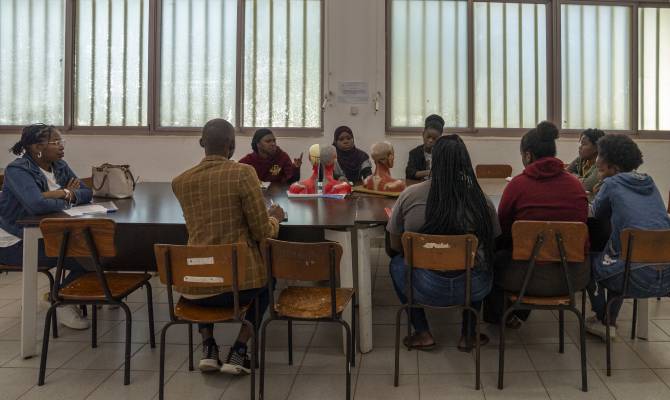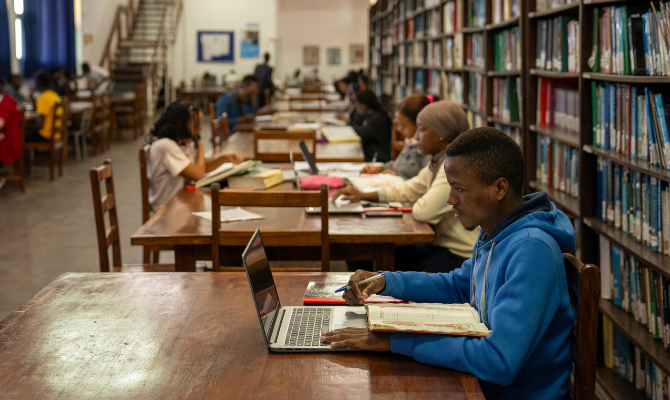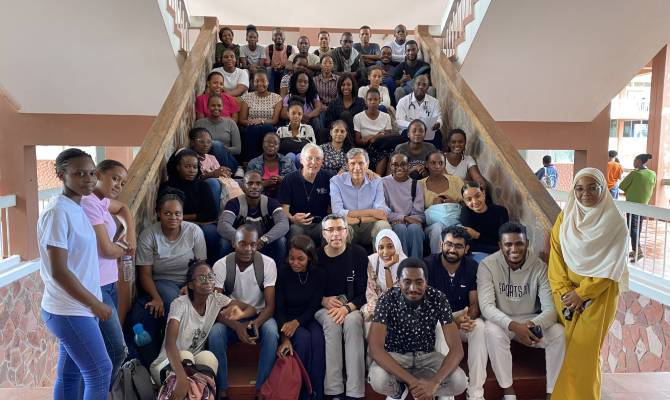Patience, humanity, trustworthiness, affability, and empathy, along with an indispensable dose of professionalism.
For Atianete, Hercília, Muaziza, and Victorino, these are the qualities that a medical professional should embody, and ones they hope to maintain throughout the years of practice ahead of them. This is what they revealed to us when we meet them in Beira, at the headquarters of the Catholic University of Mozambique (UCM). They are four of the 44 newly graduated doctors in general medicine, who were just declared doctors the day before by the Magnificent Rector, Professor Father Filipe Sungo. It was a grand ceremony that brought together professors, students, friends, and families in a day of celebration and emotion.
In his speech, the rector of UCM, Professor Filipe Sungo, thanked the students for their dedication, the professors for their commitment to teaching and continuous research, the families for their unwavering support, and the partners, including CUAMM, for their ongoing collaboration. “This achievement, which is yours,” said the Magnificent Rector in front of an audience of 893 students, “is also a testament to the collective effort that unites us as an academic community.”
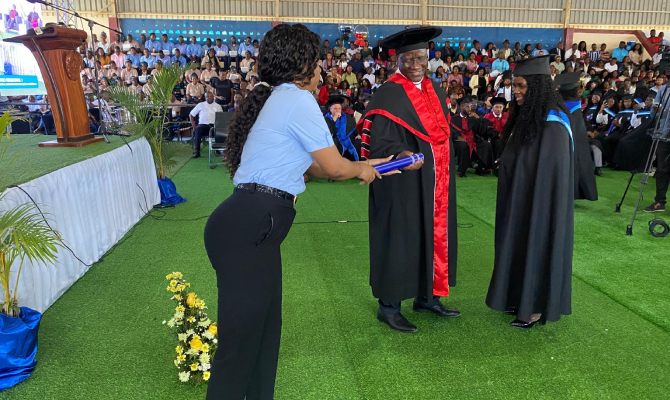
We meet our four scholarship recipients a few days after the celebrations. Their smiles and teary eyes betray the strong emotion of having reached such a long-desired milestone. It’s a contagious feeling that also reflects on our faces, and when Victorino, with a soft voice and a hint of embarrassment, says “My name is Victorino Fernando Junior, I was a medical student, today I am a general practitioner,” we can only respond with a heartfelt round of applause. Over the past eight years, Atianete, Hercília, Muaziza, and Victorino have spent most of their time between the UCM classrooms and the library, keeping their commitment and determination alive even during the most challenging periods.
“It hasn’t been an easy journey, we must admit, which is why today we are doubly happy about the goal we’ve achieved,” says Hercília, her eyes shining with satisfaction. “Eight years is a long time, the cyclone first, then the pandemic—moving forward wasn’t easy. Studying requires consistency and method, and we found ourselves having to start over so many times! The passion for this work and the support of the people who believed in us were the driving forces during the hardest moments.”
Four young doctors, four stories of commitment, and four paths still to be walked. Sitting in a small classroom at UCM, we start talking until the initial embarassed is over. Difficulties and motivation, expectations and desires is what we have shared in a long conversation.
“I thought I was more suited for IT,” confesses Victorino. “Medicine seemed like an enormous commitment; I would have had to give up much of my personal life. This faculty is like a girlfriend, it wants all your time! What convinced me? Maybe my mother’s threats. After a bad accident, it was she, a nurse, who took care of me for months. She never missed an opportunity to point out that if it hadn’t been for her training, it would have been much harder to get through that period. Today, I owe her the joy of this degree.”
The shortage of qualified healthcare professionals is, in fact, one of the biggest obstacles to the full development of the national healthcare system in Mozambique. According to the latest data (WHO, 2022), the country has 2,473 doctors for a population of 30 million people, with only 778 being specialist doctors. The average is 0.8 doctors per 10,000 inhabitants, two-thirds of whom are employed in the capital, Maputo.
“Now the clinical work begins. In Mozambique, it is mandatory to serve two years as a general practitioner before potentially specializing. We can express preferences, but it’s not guaranteed that we will be assigned where we want. Some stay in the cities, others are sent to the districts, but in any case, it will be a useful period to better understand what we want to do,” says Atianete, who hopes to move to Maputo to continue specializing in emergency medicine.
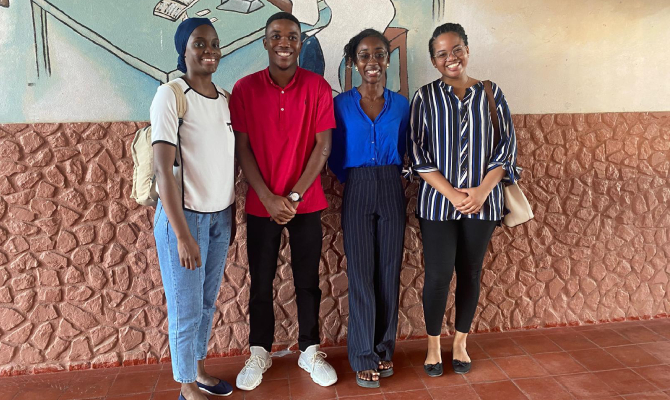
Specialization is a shared desire: Victorino will have to decide whether to become a pediatrician or a gynecologist, Hercília is sure of her passion for surgery, and Muaziza dreams of becoming Mozambique’s first endocrinologist.
Doctors with Africa CUAMM has been committed to supporting the Catholic University of Mozambique since its foundation in 1995, contributing to the establishment of the Faculty of Medicine, the second in the country. Until then, medical studies could only be pursued in the capital, Maputo, making a medical career difficult to access for those from other provinces.
“Studying away from home is challenging in many ways: you have to deal with loneliness, financial difficulties, and do your best to honor the commitment you made because you know well that behind it there are many sacrifices: yours, your family’s, and those of those who believe in your dream,” says Muaziza, from the province of Nampula.
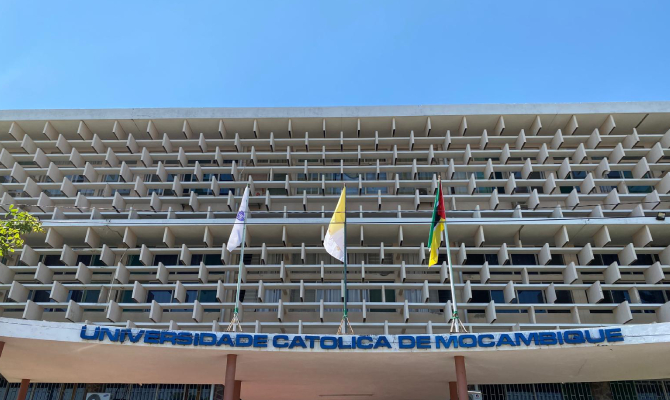
Since 2007, the year the first class of aspiring doctors graduated, Cuamm has continued to support the teaching activities of the UCM Faculty of Medicine, providing concrete assistance to the facilities (classrooms, laboratories) and equipping teaching materials (books, computers, etc.). The close collaboration on the curriculum is also significant, with visiting professors from CUAMM holding teaching modules at UCM. Additionally, within the partnership, internship opportunities are facilitated at Beira Central Hospital, research projects are promoted, and, most importantly, scholarships are offered to deserving students. This is a concrete example of cooperation that becomes a tool for the training of many students, and a bridge between distant academic realities. Every year, we renew our commitment, thanks to the support of those who, like us, wish to contribute to the dreams of young Mozambicans, the future doctors of this country.
Budget
The annual budget to support the costs of a scholarship amounts to 3,100 euros per student, broken down as follows:
| Expense Category | Annual Cost |
| Administrative fees for enrollment at Beira University | 1,500 € |
| Subsidy for food and accommodation | 1,200 € |
| Subsidy for purchasing educational materials | 400 € |
| Fee for one year | 3,100 € |
| Total fee for the entire study cycle (6 years) | 18,600 € |
What You Can Do
Join our commitment—thanks to you, we can carry out concrete actions that change the lives of many people. Support the training of local doctors.

